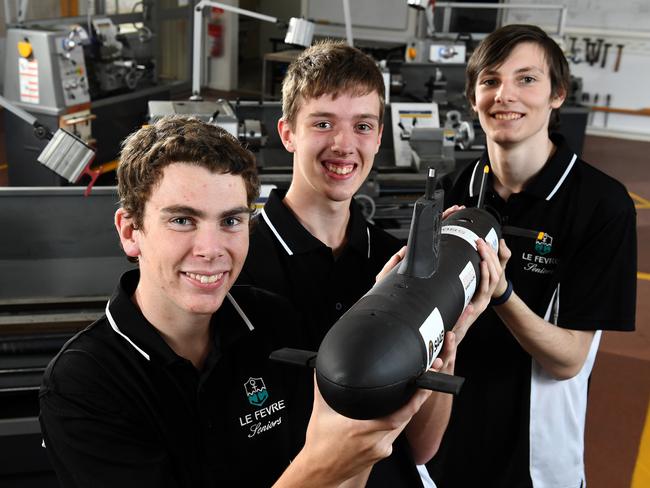Wide range of opportunities for today’s school kids to become tomorrow’s submarine builders
FROM welding to warehousing, and propulsion engineering to project management, the Future Submarines project will offer the school students of today a wide range of job opportunities.
SA News
Don't miss out on the headlines from SA News. Followed categories will be added to My News.
- Hundreds more workers needed to build Future Subs in Adelaide
- Future Subs Subs to be built by French firm DCNS in Adelaide
FROM welding to warehousing, propulsion engineering to project management, the Future Submarines project will offer the school students of today a wide range of job opportunities.
The $50 billion project is expected to create at least 2900 jobs, possibly hundreds more, including at least 1700 at ASC’s Osborne shipyard, from the mid-2020s.
ASC head of human resources Christian Hamilton said a network of schools was already providing pathways into the defence industry, and students would be smart to take on maths and science subjects if they wanted to play a part in the state’s shipbuilding future.
Mr Hamilton said the submarine build would call for many types of engineers — mechanical, electrical, power and propulsion, structural and fabrication, materials and maritime — and a wide range of trades including welders and fabricators, electricians and fitters.
There would also be a need for naval architects and supply chain experts.
“Project managers as a stand-alone capability are absolutely vital to us,” he said.
“There’s everything from administration or office staff, HR, commercial or legal, communications, and business and development opportunities.”
Mr Hamilton said participating in the Subs in Schools and F1 in Schools programs, in which students design and build their own mini-submarines and racing cars, was a great way for schools to prepare students for the high-level problem-solving skills needed in the industry.

University of South Australia chancellor Jim McDowell, a former Australian chief of global defence giant BAE Systems, said there would be jobs “across the spectrum”, from people making exotic steel used for submarines to systems engineers.
Mr McDowell, also a member of the expert advisory panel which oversaw the submarine deal’s competitive evaluation process, said TAFE and universities would have to gear up for training opportunities.
As well as the array of skills required for submarine construction, numerous business enabling jobs like lawyers, project managers and accountants would be required.
“It certainly provides skills where you’ve probably always had a few of everything and now we’re going to need quite a few of everything,’’ Mr McDowell said.
Adelaide’s three universities have already launched an unprecedented alliance, spearheaded by their three chancellors, to push into the defence sector in a bid to grow skills, jobs and research.
University of Adelaide defence and security director Michael Webb said it was likely the university would have to boost its intake of engineering and computer science students.
“These (naval projects) hold quite a lot of promise for our graduates,” Associate Professor Webb said.
“It’s something to look forward to for our kids and our grandkids.”
At Le Fevre High, the state’s official maritime school, students can take vocational maritime engineering courses leading to school-based apprenticeships, and naval engineering programs geared more towards university study in naval architecture and engineering.
Principal Rob Shepherd said the Future Submarines project would “open up very strong pathways for them (students) that will give them the capacity to thrive in our own state, because we are very conscious of young people leaving SA”.
TAFE SA mining, engineering and transport director Alison Roberts said TAFE already trained ASC apprentices in electrotechnology, mechanical engineering, and fabrication and welding.
Ms Roberts said an associate degree in electrical engineering would be launched next year and the expansion of shipbuilding in the state could lead to other new qualifications.
Le Fevre Year 12 student Aaron Thorne, 17, wants to become a fitter and turner working on ships or subs.
“I just enjoy working with metal and in a team, everyone working together to get a huge project done,” he said.



